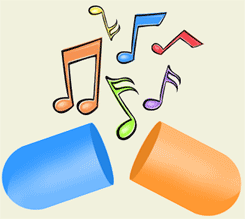
Healing potential of music therapy
Posted in General Health & Wellness on March 22, 2011. Last modified on March 28, 2019. Read disclaimer.
Imagine if there was a single medicine that could help lower blood pressure, heart rate and stress, relieve pain, and bring joy to those suffering from depression. And what if this medicine had no side effects, was available without a prescription and was available for free. The great news is that there is such a medicine... it's music! In fact, music may even be helpful in situations where we know of no other acceptable treatment.
+ Free Shipping & Returns on Eligible Items.
(*Amazon's Top 100 list updated hourly.)
Spreading the word about the healing power of music is the work of the American Music Therapy Association who's mission is to promoting the listening, playing, singing, discussing and/or creating of music as a possible rehabilitation, training, mental and physical therapy and wellness tool.
Applications where music therapy is being used, along with the benefits it may offer include:
- Correctional institutions and situations where people are transitioning into independent living: improving problem-solving, communication, self-discipline, mood control and physical conditioning skills.
- Crisis and trauma situations: providing emotional outlets, stress reduction, improved social interaction and positive emotional and physiological changes.
- Alzheimers treatment: improving memory recall, mood, self-confidence, stress reduction, emotional state and social skills.
- Childhood development: helping to build behavior, communication, social, mental and motor-development skills while helping to manage stress and pain.
- Mental health: improving mood, concentration, self-esteem, self-understanding, coping, relaxation and social skills.
- Physical therapies: lifting emotions while reducing stress, pain, anxiety. Music even holds potential as a non-invasive treatment of diseases such as diabetes, headaches and heart conditions, speeding physical recovery and shorten the length of hospital stays.
- Learning disabilities: aiding in the development of cognitive, social, emotional, physical and behavioral skills. Since music is motivating, stimulating and engaging, as well as having "universal language" qualities, it is attracting special interest in the treatment of autism.
Even the US Military is enlisting the help of music to develop short-term memory in soldiers suffering from traumatic brain injury as well as providing coping skills to those struggling from post-traumatic stress disorder and other combat-related difficulties.
 Music therapy for the management of pain
Music therapy for the management of pain
Though we often think of pain as a physical sensation, the feeling of pain is also influenced by our psychological state, social involvement and spirituality. So, by distracting attention, altering mood, and promoting relaxation, music may be an effective non-pharmaceutical method of decreasing the perception of pain, managing the symptoms of illness, and improving the subject's quality of life.
Singing, playing instruments and/or listening to music have all been found to offer pain management potential.
To learn more about music therapy and it's potential for healing, visit musictherapy.org, https://newsinhealth.nih.gov/2010/01/strike-chord-health, https://www.ncbi.nlm.nih.gov/pubmed/11816757
